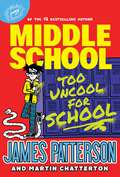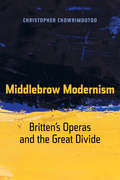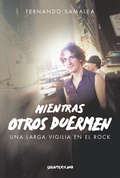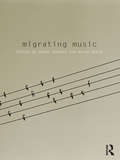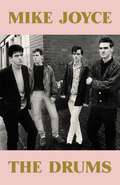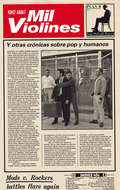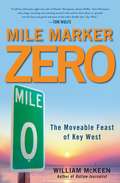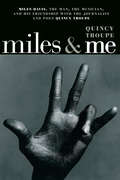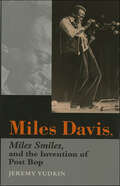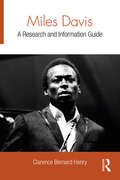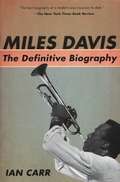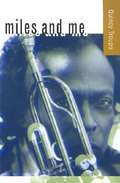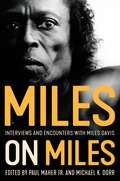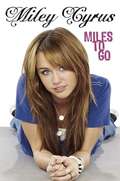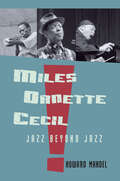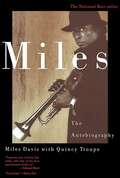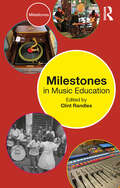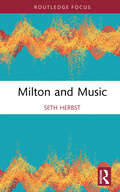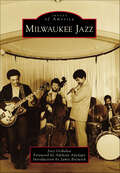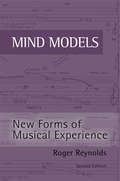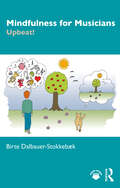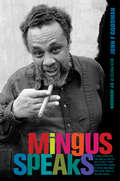- Table View
- List View
Middle School: Too Uncool for School (Middle School #17)
by James Patterson Martin ChattertonIn this hilarious installment of a #1 New York Times bestselling series, Rafe is finally getting a taste of the cool life—but his problems are red-hot! Rafe Khatchadorian has never been cool. But all that changes when he becomes the guitarist in an awesome rock band and wrangles a part-time job at Hills Village's trendiest new coffee shop slash yoga studio. No more being at the bottom of the middle school food chain—Rafe is finally going to be popular! He just has two teeny problems: the awesome rock band is led by none other than the school bully. And the band actually isn't awesome—they absolutely stink, and Rafe has to whip them into shape for the Best Band Competition. With Rafe's newfound coolness on the line, will he find a way to hit the stage in style, or is he doomed to dorkdom forever?
Middlebrow Modernism: Britten’s Operas and the Great Divide (California Studies in 20th-Century Music #24)
by Christopher ChowrimootooAt publication date, a free ebook version of this title will be available through Luminos, University of California Press’s Open Access publishing program. Visit www.luminosoa.org to learn more. Situated at the intersections of twentieth-century music history, historiography, and aesthetics, Middlebrow Modernism uses Benjamin Britten’s operas to illustrate the ways in which composers, critics, and audiences mediated the “great divide” between modernism and mass culture. Reviving mid-century discussions of the middlebrow, Christopher Chowrimootoo demonstrates how Britten’s works allowed audiences to have their modernist cake and eat it: to revel in the pleasures of consonance, lyricism, and theatrical spectacle even while enjoying the prestige that came from rejecting them. By focusing on moments when reigning aesthetic oppositions and hierarchies threatened to collapse, this study offers a powerful model for recovering shades of grey in the traditionally black-and-white historiographies of twentieth-century music.
Midnight at the Barrelhouse: The Johnny Otis Story
by George LipsitzConsidered by many to be the godfather of R&B, Johnny Otis—musician, producer, artist, entrepreneur, pastor, disc jockey, writer, and tireless fighter for racial equality—has had a remarkable life by any measure. In this first biography of Otis, George Lipsitz tells the largely unknown story of a towering figure in the history of African American music and culture who was, by his own description, &“black by persuasion.&” Born to Greek immigrant parents in Vallejo, California, in 1921, Otis grew up in an integrated neighborhood and identified deeply with black music and culture from an early age. He moved to Los Angeles as a young man and submerged himself in the city&’s vibrant African American cultural life, centered on Central Avenue and its thriving music scene. Otis began his six-decade career in music playing drums in territory swing bands in the 1930s. He went on to lead his own band in the 1940s and open the Barrelhouse nightclub in Watts. His R&B band had seventeen Top 40 hits between 1950 and 1969, including &“Willie and the Hand Jive.&” As a producer and A&R man, Otis discovered such legends as Etta James, Jackie Wilson, and Big Mama Thornton. Otis also wrote a column for the Sentinel, one of L.A.&’s leading black newspapers, became pastor of his own interracial church, hosted popular radio and television shows that introduced millions to music by African American artists, and was lauded as businessman of the year in a 1951 cover story in Negro Achievements magazine. Throughout his career Otis&’s driving passion has been his fearless and unyielding opposition to racial injustice, whether protesting on the front lines, exposing racism and championing the accomplishments of black Americans, or promoting African American musicians. Midnight at the Barrelhouse is a chronicle of a life rich in both incident and inspiration, as well as an exploration of the complicated nature of race relations in twentieth-century America. Otis&’s total commitment to black culture and transcendence of racial boundaries, Lipsitz shows, teach important lessons about identity, race, and power while encapsulating the contradictions of racism in American society.
Mientras otros duermen: Una larga vigilia en el rock
by Fernando SamaleaContinuación del exitoso Qué es un long play, en este segundo volumen de memorias Fernando Samalea, el baterista del rock argentino, explora cronológicamente, con humor y emoción, historias musicales entre 1997 y 2010. Fernando Samalea homenajea a sus compañeros de ruta con las anécdotas que los unieron: García en su incendiario período Say No More; Joaquín Sabina cuando gestaba 19 días y 500 noches, y Gustavo Cerati, a quien acompañó en sus giras Ahí vamos y Fuerza natural. En estudios, escenarios, aviones y bares de todo el mundo, los músicos de varias generaciones, estéticas y búsquedas -Fabi Cantilo, A-Tirador Láser, Caetano Veloso, Joan Manuel Serrat, Calle 13, Fernando Kabusacki...- protagonizan la novela mayor que cuenta la historia privada del rock argentino y la de la música en castellano. «Siempre me sorprendió la musicalidad de Fernando. No piensa como un baterista, no tiene vicios musicales, ni de los demás. Su primer libro me divirtió mucho. ¡Tiene más memoria que yo! Le deseo mucho éxito como escritor. Es el primer escritor-baterista que conozco.»Charly García, 2016 «Más allá de que lo admiro profundamente, se me reveló como una persona que irradia un optimismo tan contagioso como vital. Siempre tiene alguna historia para contarte, internándose sin prejuicios en mundos nuevos y haciendo amigos por doquier. A pura luz y bohemia, Sama propaga el hedonismo romántico que lo ha mantenido casi inalterable a lo largo de estos años. Es un privilegio ser su compañero de ruta y su amigo.»Gustavo Cerati, 2007
Migrating Music (CRESC)
by Jason Toynbee Byron DueckMigrating Music considers the issues around music and cosmopolitanism in new ways. Whilst much of the existing literature on ‘world music’ questions the apparently world-disclosing nature of this genre – but says relatively little about migration and mobility – diaspora studies have much to say about the latter, yet little about the significance of music. In this context, this book affirms the centrality of music as a mode of translation and cosmopolitan mediation, whilst also pointing out the complexity of the processes at stake within it. Migrating music, it argues, represents perhaps the most salient mode of performance of otherness to mutual others, and as such its significance in socio-cultural change rivals – and even exceeds – literature, film, and other language and image-based cultural forms. This book will serve as a valuable reference tool for undergraduate and postgraduate students with research interests in cultural studies, sociology of culture, music, globalization, migration, and human geography.
Mike Joyce - The Drums
by Mike JoyceThe long overdue reflection of life in The Smiths from their legendary drummer.As a band, the Smiths need no introduction. Formed in 1982 and disbanded in 1987, all four of their studio albums reached the top five in the UK charts. They are widely lauded as one of the most influential groups of all time.Mike is the last member of the band to release their autobiography and this is his no-holds-barred story of what it was like to play the drums in the Smiths. Throughout his honest and witty reflections, Mike answers the question he and bassist Andy Rourke used to often ask each other: &‘Where did it all go right?&’A lot of the Smiths&’ past is already canonised. Rather than retelling those well-documented iconic moments, in The Drums, Mike conveys &‘the feeling&’ of his time in the band. His off-piste, frank and witty perspective allows him to re-contextualise fan favourite moments through a beautifully vulnerable, human insight into his life.The written history of the Smiths is not missing an encyclopedic account of everything that happened over the years; but Mike&’s honest, entertaining and deeply human memoir is what Smiths fans have been waiting for. This book truly conveys what it felt like to be a member of the Smiths.In The Drums, Mike Joyce finally gives us the perspective of the self-confessed biggest Smiths fan in the world who from the start was just some lad from the suburbs of Fallowfield who played the drums.
Mil violines y otras crónicas sobre pop y humanos
by Kiko AmatLas canciones son el eje alrededor del cual gira todo, y el nexo de unión entre las diversas historias (ficticias o no) que se cuentan. El libro no pretende ser ensayístico ni autobiográfico en cada uno de los caminos que va tomando, así que el autor puede permitirse incorporar narrativa, diálogos, listas, y lo que se le vaya ocurriendo graciosamente. También tienen cabida situaciones cotidianas. Estas pueden ser similares en tono y contenido a la serie de columnas que al autor realizó para La Vanguardia y Catorcephenia. Es decir, basarse en la misma línea temática: la relación del autor y sus canciones con otra persona, en este caso su mujer, que aparecería regularmente en cada capítulo, incluso situando la acción en el momento de escribir el libro.
Mil violines y otras crónicas sobre pop y humanos
by Kiko AmatEste es un libro sobre música pop. Todo aquel que no sea fan de ésta entra aquí por su cuenta y riesgo Un paseo del autor por las canciones de su vida. Las canciones son el eje alrededor del cual gira todo, y el nexo de unión entre las diversas historias (ficticias o no) que se cuentan. El libro no pretende ser ensayístico ni autobiográfico en cada uno de los caminos que va tomando, así que el autor puede permitirse incorporar narrativa, diálogos, listas, y lo que se le vaya ocurriendo graciosamente. También tienen cabida situaciones cotidianas. Estas pueden ser similares en tono y contenido a la serie de columnas que al autor realizó para La Vanguardia y Catorcephenia. Es decir, basarse en la misma línea temática: la relación del autor y sus canciones con otra persona, en este caso su mujer, que aparecería regularmente en cada capítulo, incluso situando la acción en el momento deescribir el libro.
Mile Marker Zero: The Moveable Feast of Key West
by William MckeenTrue tales of writers and pirates, painters and potheads, guitar pickers and drug merchants in America's southernmost city For Hemingway and Fitzgerald, there was Paris in the twenties. For others, later, there was Greenwich Village, Big Sur, and Woodstock. But for an even later generation--one defined by the likes of Jimmy Buffett, Tom McGuane, and Hunter S. Thompson--there was another moveable feast: Key West, Florida. The small town on the two-by-four-mile island has long been an artistic haven, a wild refuge for people of all persuasions, and the inspirational home for a league of great American writers. Some of the artists went there to be literary he-men. Some went to re-create themselves. Others just went to disappear--and succeeded. No matter what inspired the trip, Key West in the seventies was the right place at the right time, where and when an astonishing collection of artists wove a web of creative inspiration.Mile Marker Zero tells the story of how these writers and artists found their identities in Key West and maintained their friendships over the decades, despite oceans of booze and boatloads of pot, through serial marriages and sexual escapades, in that dangerous paradise.Unlike the "Lost Generation" of Paris in the twenties, we have a generation that invented, reinvented, and found itself at the unending cocktail party at the end--and the beginning--of America's highway.
Miles & Me: Miles Davis, the man, the musician, and his friendship with the journalist and poet Quincy Troupe
by Quincy TroupeAn intimate story of Miles Davis, the man, the musician, and his friendship with the young journalist and poet Quincy Troupe--soon to be a major motion picture.Poet, activist and journalist Quincy Troupe's candid account of his friendship with Miles Davis is a revealing portrait of a great musician and an engrossing chronicle of the author's own artistic and personal growth. Miles and Me describes in intimate detail the sometimes harrowing processes of Davis's spectacular creativity and the joys and travails Davis's passionate and contradictory temperament posed to the two men's friendship. Miles and Me shows how Miles Davis, both as an artist and as a black man, influenced Troupe and whole generations of Americans while forever changing the face of jazz.In 1985, Spin magazine hired Troupe to do an exclusive two-part interview with the by-then legendary jazz artist Davis. The hour-and-a-half scheduled interview stretched to ten hours. After it was published, Davis was so enamored of Troupe and the interview that he finally relented to a major publisher's request that he write his autobiography under the condition that they could get Quincy Troupe to write it. Miles: The Autobiography became an instant bestseller and opened up the entire field of popular music autobiography. Years later, Quincy went back to his notes of his time with Miles that had been so important to them both, and produced this more intimate book, Miles and Me, told from his side of their friendship. Miles and Me takes us from St. Louis, where both men grew up, to New York, where both men lived, to Malibu where Miles also kept a home. Troupe also takes us through the entire catalogue of Davis's recordings. Troupe calls his friend "irascible, contemptuous, brutally honest, ill-tempered when things didn't go his way, complex, fair-minded, humble, kind, and a son-of-a-bitch." The author's love and appreciation infuses Miles and Me with a rare quality of grace, and at the same time, throughout the book, Troupe's observations of his friend are keen, sometimes hilariously funny, and truthful, as he knows Miles would want him to be.
Miles Davis (Impact Biographies)
by Franklin Watts George R. CrispPeople whose power, influence, or perseverance have changed the world are the subjects of these candid biographies, which stress the impact of these individuals on the course of 20th-century events. Each book includes a bibliography and an index. Trumpeter, bandleader, and composer Miles Davis greatly influenced the course of jazz from the late 1940s until his death in 1991. He used his thoughtful, economical trumpet style to forge a stunning variety of new sounds. This frank, mesmerizing biography takes the reader inside the dazzling world of Miles Davis: his relationships with other jazz masters, his impact on jazz styles and innovations; and his recurrent health and drug problems.
Miles Davis, Miles Smiles, and the Invention of Post Bop
by Jeremy YudkinFocusing on one of the legendary musicians in jazz, this book examines Miles Davis's often overlooked music of the mid-1960s with a close examination of the evolution of a new style: post bop. Jeremy Yudkin traces Davis's life and work during a period when the trumpeter was struggling with personal and musical challenges only to emerge once again as the artistic leader of his generation.A major force in post-war American jazz, Miles Davis was a pioneer of cool jazz, hard bop, and modal jazz in a variety of small group formats. The formation in the mid-1960s of the Second Quintet with Wayne Shorter, Herbie Hancock, Ron Carter, and Tony Williams was vital to the invention of the new post bop style. Yudkin illustrates and precisely defines this style with an analysis of the 1966 classic Miles Smiles.
Miles Davis: A Research and Information Guide (Routledge Music Bibliographies)
by Clarence Bernard HenryThis research and information guide provides a wide range of scholarship on the life, career, and musical legacy of Miles Davis, and is compiled for an interdisciplinary audience of scholars in jazz and popular music, musicology, and cultural studies. It serves as an excellent tool for librarians, researchers, and scholars sorting through the massive amount of material in the field.
Miles Davis: The Definitive Biography
by Ian CarrThis exhaustively researched, revised edition of Ian Carr's classic biography throws new light on Davis' life and career: from the early days in New York with Charlie Parker; to the Birth of Cool; through his drug addiction in the early 1950s and the years of extraordinary achievements (1954-1960), during which he signed with Columbia and collaborated with such unequaled talents as John Coltrane, Bill Evans, Wynton Kelly and Cannonball Adderly. Carr also explores Davis' dark, reclusive period (1975-1980), offering firsthand accounts of his descent into addiction, as well as his dramatic return to life and music. Carr has talked with the people who knew Miles and his music best including Bill Evans, Joe Zawinul, Keith Jarrett, and Jack DeJohnette, and has conducted interviews with Ron Carter, Max Roach, John Scofield and others.
Miles and Me
by Quincy TroupeQuincy Troupe's candid account of his friendship with Miles Davis is a revealing portrait of a great musician and an intimate study of a unique relationship. It is also an engrossing chronicle of the author's own development, both artistic and personal. As Davis's collaborator on Miles: The Autobiography, Troupe--one of the major poets to emerge from the 1960s--had exceptional access to the musician. This memoir goes beyond the life portrayed in the autobiography to describe in detail the processes of Davis's spectacular creativity and the joys and difficulties his passionate, contradictory temperament posed to the men's friendship. It shows how Miles Davis, both as a black man and an artist, influenced not only Quincy Troupe but whole generations. Troupe has written that Miles Davis was "irascible, contemptuous, brutally honest, ill-tempered when things didn't go his way, complex, fair-minded, humble, kind and a son-of-a-bitch." The author's love and appreciation for Davis make him a keen, though not uncritical, observer. He captures and conveys the power of the musician's presence, the mesmerizing force of his personality, and the restless energy that lay at the root of his creativity. He also shows Davis's lighter side: cooking, prowling the streets of Manhattan, painting, riding his horse at his Malibu home. Troupe discusses Davis's musical output, situating his albums in the context of the times--both political and musical--out of which they emerged.
Miles on Miles: Interviews and Encounters with Miles Davis (Musicians in Their Own Words)
by Paul Maher Jr.; Michael K. DorrMiles Davis was not only a musical genius, but also an enigma, and nowhere else was he so compelling, exasperating, and entertaining as he was in his interviews, which vary from polite to outrageous, from straight-ahead to contrarian. Miles on Miles collects thirty of the most vital. Even his autobiography lacks the immediacy of the dialogues collected here. Many were conducted by leading journalists like Leonard Feather, Stephen Davis, Ben Sidran, Mike Zwerin, and Nat Hentoff. Other have never before seen print and are newly transcribed from radio and television shows. Until now, no book has brought back to life Miles's inimitable voice—contemplative, defiant, elegant, uncompromising, and humorous. Miles on Miles will long remain the definitive source for anyone wanting to really encounter the legend in print.
Miles to Go
by Hilary Liftin Miley CyrusThree years ago, Miley Cyrus was a virtual unknown. Her life in rural Tennessee was filled with family, friends, school, cheerleading, and the daily tasks of living on a farm. And then came a little show called Hannah Montana. Almost overnight, Miley would rocket to superstardom, becoming a television and singing phenomenon. Quiet days were replaced with sold-out concerts, television appearances, and magazine shoots. But through it all, Miley has remained close to her family and friends and has stayed connected to the Southern roots that made her so strong. In Miles to Go, Miley offers an honest, humorous, and often touching story of one girl's coming-of-age--from private moments with her pappy to off-roading with her dad, Billy Ray, to her run-ins with mean girls. Miley talks about suffering through drama and heartbreak and coming out the other end unscathed (relatively). And now for the first time, she will discuss it all-the milestones still left to reach (driver's license! voting!), dreams to live out (travel to Asia! find true love!), and the lessons to be learned (remembering to enjoy every moment!). This is a truly unique look inside the world of one of today's biggest and brightest stars as she tackles looking back and moving forward.
Miles, Ornette, Cecil: Jazz Beyond Jazz
by Howard MandelMiles Davis, Ornette Coleman, and Cecil Taylor revolutionized music from the end of the twentieth century into the twenty-first, expanding on jazz traditions with distinctly new concepts of composition, improvisation, instrumentation, and performance. They remain figures of controversy due to their border-crossing processes. Miles, Ornette, Cecil is the first book to connect these three icons of the avant-garde, examining why they are lionized by some critics and reviled by others, while influencing musicians across such divides as genre, geography, and racial and ethnic backgrounds. Mandel offers fresh insights into their careers from interviews with all three artists and many of their significant collaborators, as well as a thorough overview of earlier interpretations of their work.
Miles: The Autobiography
by Quincy Troupe Miles DavisFor more than forty years Miles Davis has been in the front rank of American music. Universally acclaimed as a musical genius, Miles is one of the most important and influential musicians in the world. The subject of several biographies, now Miles speaks out himself about his extraordinary life. Miles: The Autobiography,like Miles himself, holds nothing back. For the first time Miles talks about his five-year silence. He speaks frankly and openly about his drug problem and how he overcame it. He condemns the racism he has encountered in the music business and in American society generally. And he discusses the women in his life. But above all, Miles talks about music and musicians, including the legends he has played with over the years: Bird, Dizzy, Monk, Trane, Mingus, and many others. The man who has given us some of the most exciting music of the past few decades has now given us a compelling and fascinating autobiography, featuring a concise discography and thirty-two pages of photographs.
Milestones in Music Education (Milestones)
by Clint RandlesIn ten concise chapters, Milestones in Music Education introduces the key developments and issues that have shaped the field of music education. Designed for undergraduate students, each chapter of the book is written by a different expert, bringing together many leading voices in the field. The ten chosen milestones represent breakthroughs in the field of music education that are relevant to today’s educators, and enable teachers to understand the issues that have shaped the teaching of music over time. Topics covered include the origins of music education as a school subject, the impact of changing technology, the roles of popular music and notation, and racial justice in the music classroom. Featuring action suggestions and discussion questions in each chapter, this accessible book provides students with a foundation in the history and context of music education, and prepares them to engage with the social and philosophical aspects of teaching music as forward-thinking educators. Milestones are a range of accessible textbooks, breaking down the need-to-know moments in the social, cultural, political and artistic development of foundational subject areas. This book is ideal for undergraduate courses in music education.
Milton and Music (Routledge Focus on Literature)
by Seth HerbstMilton and Music is the first study to juxtapose John Milton’s poetry on music with later musical adaptations of his work. In Part I: Milton on Music, Seth Herbst shows that writing about music galvanized Milton’s intellectual development towards animist materialism, the belief that everything in the universe—even the human soul—is made of matter. The Milton who emerges is a forward-thinking visionary who leaped past his contemporaries in conceiving music as a material phenomenon that exists simultaneously as sound and metaphor. Part II: Milton in Music follows two daring composers in investigating whether Milton’s visionary concept of music can be realized in actual musical sound. In Samson, an oratorio adaptation of Milton’s Samson Agonistes, Handel resists Miltonic music theory, suggesting that music struggles to function as both sound and metaphor. By contrast, the twentieth-century Polish composer Krzysztof Penderecki composes an iconoclastic opera of Paradise Lost that develops a soundworld of fractured dissonance in which music acts as both sound and metaphor. Recovering Milton’s own high estimation of music from a critical tradition that has subordinated it to the poet’s political and religious convictions, Herbst reveals Milton as an interdisciplinary thinker and overlooked figure in the study of words and music. Driven by bold claims about the comparative treatment of literature and music, Milton and Music revises our understanding of what makes this canonical poet an intellectual revolutionary.
Milwaukee Jazz (Images of America)
by Joey GrihalvaMilwaukee's jazz scene has forever stood in the shadow of Chicago's illustrious institution, but it stands strong. Cream City has produced a wealth of talent, attracted top-notch transplants, and hosted legends like Duke Ellington, Dizzy Gillespie, Herbie Hancock, Billie Holiday, and Wynton Marsalis. From the heyday of the 1940s and 1950s to the renaissance of the 1970s, from the streets to the classrooms, from grand ballrooms to outdoor festivals, from swing to bebop, from smoky bars to dimly lit clubs like the Flame, Thelma's Back Door, and the Jazz Gallery, Milwaukee has been a hotbed of improvised music, providing a noteworthy contribution to the story of jazz in America.
Mind Models
by Roger ReynoldsThis new edition of Mind Models reintroduces and renews a classic work on 20th century composition, one that has remained relevant for over a quarter century -- and should remain a central reading for decades to come.
Mindfulness for Musicians: Upbeat!
by Birte Dalbauer-StokkebækMindfulness for Musicians: Upbeat! is a guide to the theory and practice of mindfulness in the context of music performance. Including chapters on the importance of breath, emotions and the nervous system, this book features reflections and mindfulness practices throughout as opportunities for application. With full colour illustrations throughout and a series of audio recordings that allow readers to experience examples of mindful meditation, this book provides a unique guide to the mindfulness needs of musicians. Mindfulness for Musicians: Upbeat! is essential reading for musicians of all levels, including those learning in formal classroom settings as undergraduates.
Mingus Speaks
by Sy Johnson John F. GoodmanCharles Mingus is among jazz's greatest composers and perhaps its most talented bass player. He was blunt and outspoken about the place of jazz in music history and American culture, about which performers were the real thing (or not), and much more. These in-depth interviews, conducted several years before Mingus died, capture the composer's spirit and voice, revealing how he saw himself as composer and performer, how he viewed his peers and predecessors, how he created his extraordinary music, and how he looked at race. Augmented with interviews and commentary by ten close associates--including Mingus's wife Sue, Teo Macero, George Wein, and Sy Johnson--Mingus Speaks provides a wealth of new perspectives on the musician's life and career. As a writer for Playboy, John F. Goodman reviewed Mingus's comeback concert in 1972 and went on to achieve an intimacy with the composer that brings a relaxed and candid tone to the ensuing interviews. Much of what Mingus shares shows him in a new light: his personality, his passions and sense of humor, and his thoughts on music. The conversations are wide-ranging, shedding fresh light on important milestones in Mingus's life such as the publication of his memoir, Beneath the Underdog, the famous Tijuana episodes, his relationships, and the jazz business.
